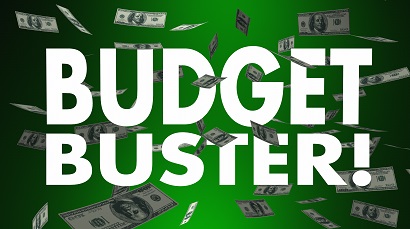WinCU Family & Friends Blog

Budget Busters – Tips to Staying On track
I work hard to keep our family budget on track, but it seemed no matter how hard I tried…an unexpected expense would come along and ruin all my hard work. Like the time my son decided to throw my iPhone in a bucket of water!
Here are some good tips to start a budget, the most common budget busters and action you can take to stay on track:
Know your income. Review your paycheck to understand exactly home much money you are taking home each month. Depending on how often you get paid you may have to do some calculations to figure out your monthly pay. However, some people prefer to simply go off of a bye-weekly plan when setting the budget. This means you get paid every other week and you plan your budget assuming you get to paychecks per month. When in reality there will be 2 months out of the year you will get three paychecks. Either way figure out your monthly income or cash in.
Add up all your monthly expenses. Start with the monthly bills you know always come up. Plan for what the bills usually are. For example you know electric is more expensive during summer with A/C on and winter might have higher gas charges having the heat on. So what a lot of people do is take an average and plan for that. Knowing some months it might be a little more or a little less.
This is your first budget buster, if you plan for a utility bill to be $50, but because of extremely cold weather your gas bill comes back at $95. That's why you want to try to work in a cushion or plan ahead knowing if a bill is going to be higher than normal.
Once you have a total of all your monthly bills, start planning for your annual or semi-annual bills. Examples of these would be property tax, car insurance, life insurance, etc. So, for these just break it down into monthly expense and put it aside each month. Then, when the bill comes you know you have enough money. This is the second budget buster because it is a common mistake to forget about these bills because they are irregular.
Once you have your income and expense understood, you have a good start on your budget. So, those are your fixed cost, but you know more bills are on the way. You have gas, food, and entertainment/hobbies. You also need budget for these. I think the best strategy is to go over your transaction history on your account every month and break it down into categories to track your spending.
You can use whatever logical categories that makes sense to you. Some of the categories I use are; gas, restaurant, groceries, entertainment, clothes, vehicle maintenance. Once you start breaking down your purchases things should start to make sense to you. This is the third budget buster because it can sometimes be hard to plan for some of these while other are seasonal. Take clothing for example, back to school time for parents can be a big clothing expense time of the year and they could go several more months before needing another purchase. That's why planning again and budgeting is so important.
The last budget buster is the toughest one. That's unplanned expenses... These get everybody. Everything is going great with your budget and you are finally being able to put a little money away each paycheck... Then boom, your car breaks down and you are hit with an unexpected $1,500 repair. That's why you really want to plan for the unexpected. Start small if you have to, but put away money for unexpected bills so they aren't so devastating to a budget when they come up.
Once you have all your categories, try breaking down some of the bigger categories and open separate savings accounts each. Something I do is breakdown all my budgeted fixed costs and transfer those out of my paycheck into a separate checking account. So for example, if your fixed expenses total $1,200 every month I will transfer $600 out of each paycheck into a separate account just to put aside money for bills.
Remember, the first and most important step, get started! Also, don't get discouraged if you get hit by a budget buster, If your budget gets busted just take it as a learning experience and get back to budgeting. When it comes to budgeting, the most successful people stick with their budget revisit their budget and revisit it frequently. GOOD LUCK!
